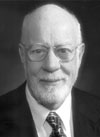
Vol. 75, No. 7, July
2002
Legislative Council Sets Study Committees
Legislative Council study committees are set to review Wisconsin's
open records law, public health system response to terrorism and public
health emergencies, relative caregivers, mental health parity, and other
major issues and problems identified by the state legislature.
by Fred Risser & Kitty Rhoades
 Sen. Fred
Risser (D-Madison) and Rep. Kitty Rhoades
(R-Hudson) cochair the Joint Legislative Council, whose primary
responsibility is to establish study committees to examine major issues
and problems identified by the Legislature.
Sen. Fred
Risser (D-Madison) and Rep. Kitty Rhoades
(R-Hudson) cochair the Joint Legislative Council, whose primary
responsibility is to establish study committees to examine major issues
and problems identified by the Legislature.  The Wisconsin Statutes specify that the
president of the Senate and the speaker of the Assembly or their
designees serve as cochairs of the Joint Legislative Council. Sen.
Risser can be reached at (608) 266-1627. Rep. Rhoades can be reached at
(608) 266-1526.
The Wisconsin Statutes specify that the
president of the Senate and the speaker of the Assembly or their
designees serve as cochairs of the Joint Legislative Council. Sen.
Risser can be reached at (608) 266-1627. Rep. Rhoades can be reached at
(608) 266-1526.
Every two-year session, the Joint Legislative Council, a nonpartisan
support entity to the Wisconsin Legislature, approves a slate of study
committees to examine major issues and problems identified by the
Legislature. The study committees are made up of legislators and
citizens interested in or knowledgeable about the study topic. As
cochairs of the Joint Legislative Council, we strive to ensure that the
council chooses study topics that are timely, of interest, and important
to the State of Wisconsin.
The work of study committees is done primarily during the
Legislature's recess (during the fall of even-numbered years). Study
committees often will formulate legislative recommendations on the
issues and, after approval by the Joint Legislative Council, those
recommendations are introduced as legislation in the next legislative
session. This biennium's slate of special study committees includes:
- Review of Fireworks Law
- Public and Private Broadband
- Improving Wisconsin's Fiscal Management
- Review of the Open Records Law
- Relative Caregivers
- Placement and Services for Persons with Disabilities
- Public Health System Response to Terrorism and Public Health
Emergencies
- Mental Health Parity
- Actions Affecting the Family
- Recodification of Town Highway Statutes
Review of Fireworks Law
Cochaired by Sen. Fred Risser (D-Madison) and Rep. Stephen Freese
(R-Dodgeville), the Review of Fireworks Law Committee will study issues
surrounding the sale, possession, and use of fireworks in Wisconsin. The
committee also will review current Wisconsin law regulating fireworks,
including the interaction between state and federal law and the impact
of the law on fireworks retailers, local units of government, the law
enforcement community, the state economy, and the public and recommend
improvements to the law.
Public and Private Broadband
Cochaired by Sen. Richard Grobschmidt (D-South Milwaukee) and Rep.
Phil Montgomery (R-Ashwaubenon), the Public and Private Broadband
Committee will study the availability of broadband services and barriers
to broadband deployment in Wisconsin. The committee also will determine
appropriate state policy relating to digital divide and open access
issues.
Improving Wisconsin's Fiscal Management
Cochaired by Sen. Robert Jauch (D-Poplar) and Rep. Donald Friske
(R-Merrill), the Fiscal Management Committee is directed to examine ways
for Wisconsin to improve its ability to manage its finances using modern
financial management and policy practices in the context of the budget
process.
Review of the Open Records Law
Cochaired by Sen. Jon Erpenbach (D-Middleton) and Rep. Mark Gundrum
(R-New Berlin), the Open Records Law Committee is directed to review the
Wisconsin Supreme Court decisions in Woznicki v. Erickson and
Milwaukee Teachers' Educational Association v. Milwaukee Board of
School Directors and recommend legislation implementing the
procedures anticipated in the opinions, amending the holdings of the
opinions, or overturning the opinions. In addition, the committee is
directed to recommend changes in the open records law to accommodate
electronic communications and to consider the sufficiency of an open
records request and the scope of exemptions to the open records law.
Relative Caregivers
Cochaired by Sen. Gwendolynne Moore (D-Milwaukee) and Rep. Steve
Kestell (R-Elkhart Lake), the Relative Caregivers Committee is directed
to study: 1) current law relating to relative caregivers under the
Children's Code and under current law relating to guardianship and
kinship care; 2) relatives who care for children under an informal
agreement between the child's parent and the relatives and whether such
relatives should be granted decision-making authority with respect to
the child's care; and 3) third-party visitation law and enforcement of
third-party visitation orders.
Recodification of Chapter 55, Placement and Services for
Persons with Disabilities
Cochaired by Sen. Robert Wirch (D-Kenosha) and Rep. Suzanne Jeskewitz
(R-Menomonee Falls), the Placement and Services for Persons with
Disabilities Committee is directed to conduct a recodification of Wis.
Stat. chapter 55. The recodification may include a review of court
decisions relating to the chapter to determine whether the court
decisions should be codified as is or with modifications. The committee
also will examine the different interpretations of chapter 55 that have
arisen over time and determine which practices could be applied
statewide and examine areas of chapter 55 that are unclear or vague and
require clarification.
Public Health System's Response to Terrorism and Public
Health Emergencies
Cochaired by Sen. Judy Robson (D-Beloit) and Rep. Frank Urban
(R-Brookfield), the Response to Terrorism and Public Health Emergencies
Committee is directed to examine: 1) the capacity of the public health
system, and the adequacy of state laws to enable that system to detect
and respond quickly to a terrorist act or public health emergency; 2)
the coordination of activities of the public health system with other
systems involved in responding to a terrorist act or public health
emergency; and 3) the adequacy and flexibility of resources available to
these systems that can be used to detect and respond to terrorist acts
and public health emergencies.
Mental Health Parity
Cochaired by Sen. Dave Hansen (D-Green Bay) and Rep. Daniel Vrakas
(R-Hartland), the Mental Health Parity Committee is directed to study
the costs and benefits of providing parity in the insurance coverage of
mental illnesses in Wisconsin. The committee will study the experience
following the enactment of the federal mental health parity law and the
experiences of other states that have enacted mental health parity laws,
with a view toward developing legislation in this area.
Recodification of Chapter 767, Actions Affecting the
Family
Cochaired by Sen. Mark Meyer (D-La Crosse) and Rep. Glenn Grothman
(R-West Bend), the Actions Affecting the Family Committee will conduct a
recodification of Wis. Stat. chapter 767 relating to actions affecting
the family. The recodification may include a study of possible
reorganization of the chapter in a logical manner, renumbering and
retitling sections, consolidating related provisions, modernizing
language, resolving ambiguities in language, codifying court decisions,
and making minor substantive changes.
Recodification of Town Highway Statutes
Cochaired by Sen. Roger Breske (D-Eland) and Rep. John Ainsworth
(R-Shawano), the Recodification of Town Highway Statutes Committee is
directed to recodify Wis. Stat. chapters 80 and 81 regarding town
highways and any other matters contained within those statutes or
related statutes. The recodification may include a study of
reorganization of the chapter in a logical manner, renumbering and
retitling sections, consolidating related provisions, modernizing
language, resolving ambiguities in language, codifying court decisions,
and making minor substantive changes.
Wisconsin
Lawyer
